BSc Business Law: UK Legal System, Legislation & Employment Law
VerifiedAdded on 2023/06/17
|9
|3068
|194
Report
AI Summary
This report provides a comprehensive overview of the UK legal system for business law, focusing on the classifications of law, sources of law, and employment law. It defines laws and identifies the legal systems in the UK, explaining civil and criminal law with examples. The report details the roles of the High Court and the Supreme Court, explores case law as a source of law, and explains the process of making legislation, including delegated legislation. Furthermore, it discusses statutory duties of employers to their employees, wrongful dismissal, and unfair dismissal actions within the UK law-making process. This document is available on Desklib, a platform offering study tools and solved assignments for students.
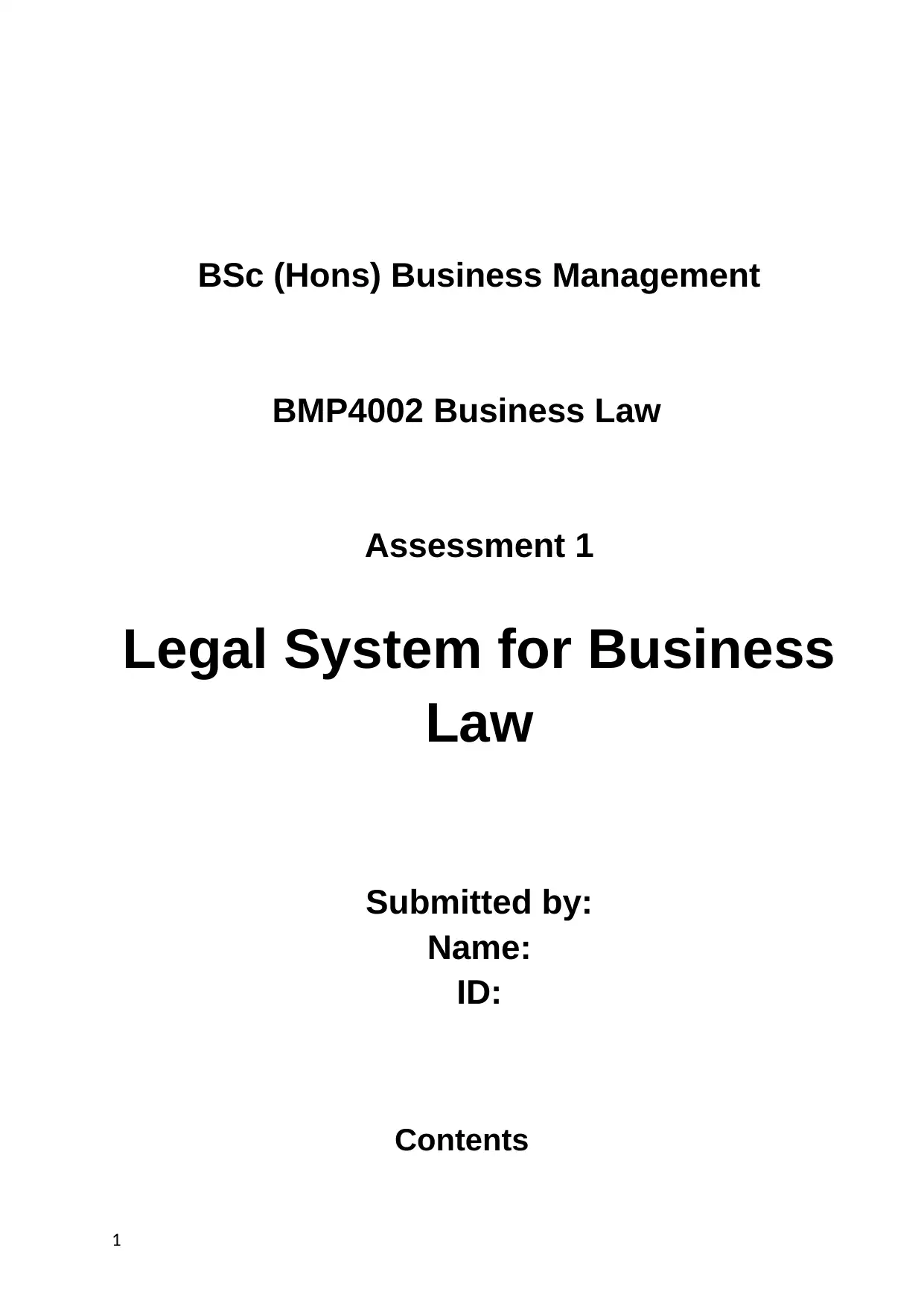
BSc (Hons) Business Management
BMP4002 Business Law
Assessment 1
Legal System for Business
Law
Submitted by:
Name:
ID:
Contents
1
BMP4002 Business Law
Assessment 1
Legal System for Business
Law
Submitted by:
Name:
ID:
Contents
1
Paraphrase This Document
Need a fresh take? Get an instant paraphrase of this document with our AI Paraphraser
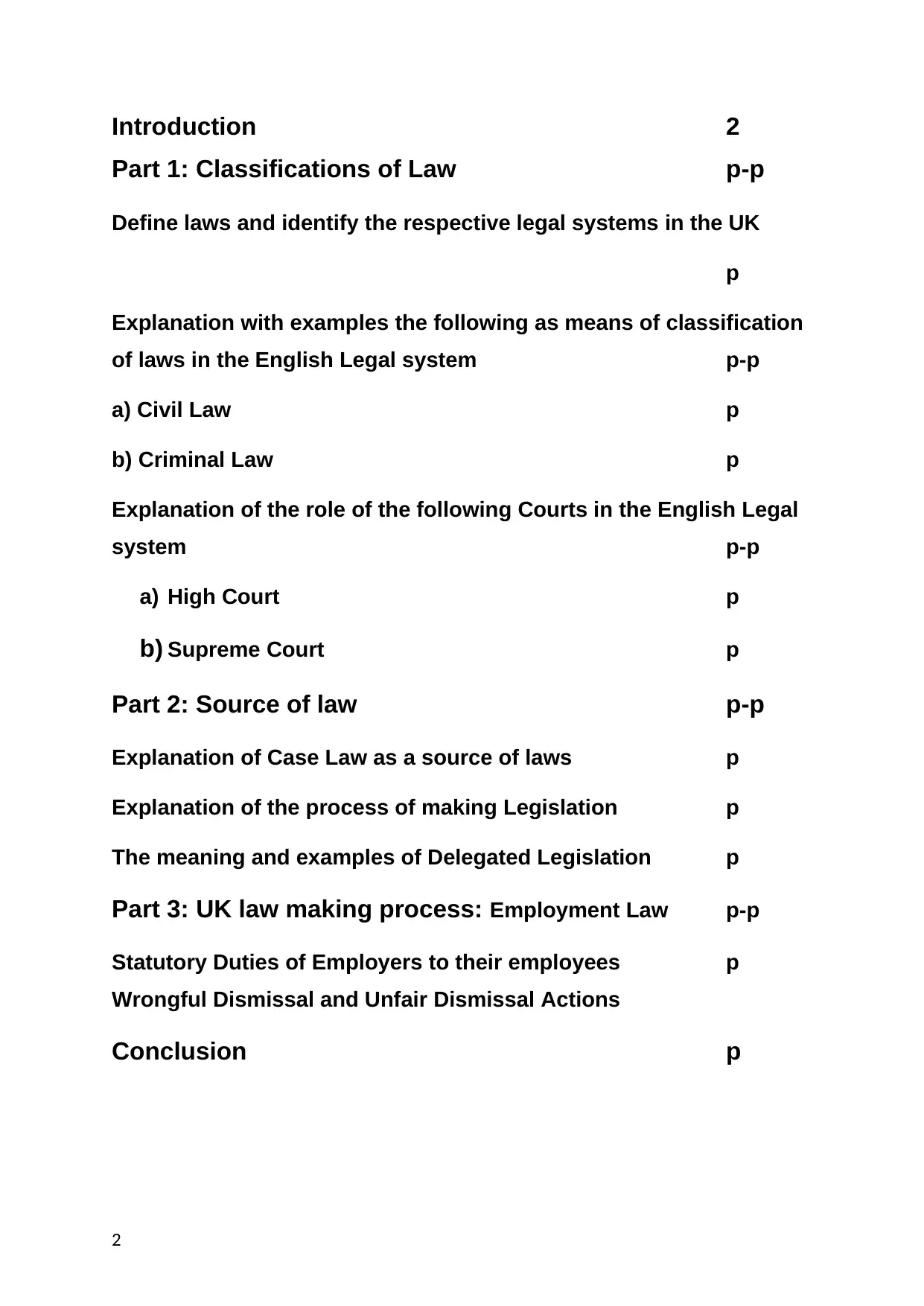
Introduction 2
Part 1: Classifications of Law p-p
Define laws and identify the respective legal systems in the UK
p
Explanation with examples the following as means of classification
of laws in the English Legal system p-p
a) Civil Law p
b) Criminal Law p
Explanation of the role of the following Courts in the English Legal
system p-p
a) High Court p
b) Supreme Court p
Part 2: Source of law p-p
Explanation of Case Law as a source of laws p
Explanation of the process of making Legislation p
The meaning and examples of Delegated Legislation p
Part 3: UK law making process: Employment Law p-p
Statutory Duties of Employers to their employees p
Wrongful Dismissal and Unfair Dismissal Actions
Conclusion p
2
Part 1: Classifications of Law p-p
Define laws and identify the respective legal systems in the UK
p
Explanation with examples the following as means of classification
of laws in the English Legal system p-p
a) Civil Law p
b) Criminal Law p
Explanation of the role of the following Courts in the English Legal
system p-p
a) High Court p
b) Supreme Court p
Part 2: Source of law p-p
Explanation of Case Law as a source of laws p
Explanation of the process of making Legislation p
The meaning and examples of Delegated Legislation p
Part 3: UK law making process: Employment Law p-p
Statutory Duties of Employers to their employees p
Wrongful Dismissal and Unfair Dismissal Actions
Conclusion p
2
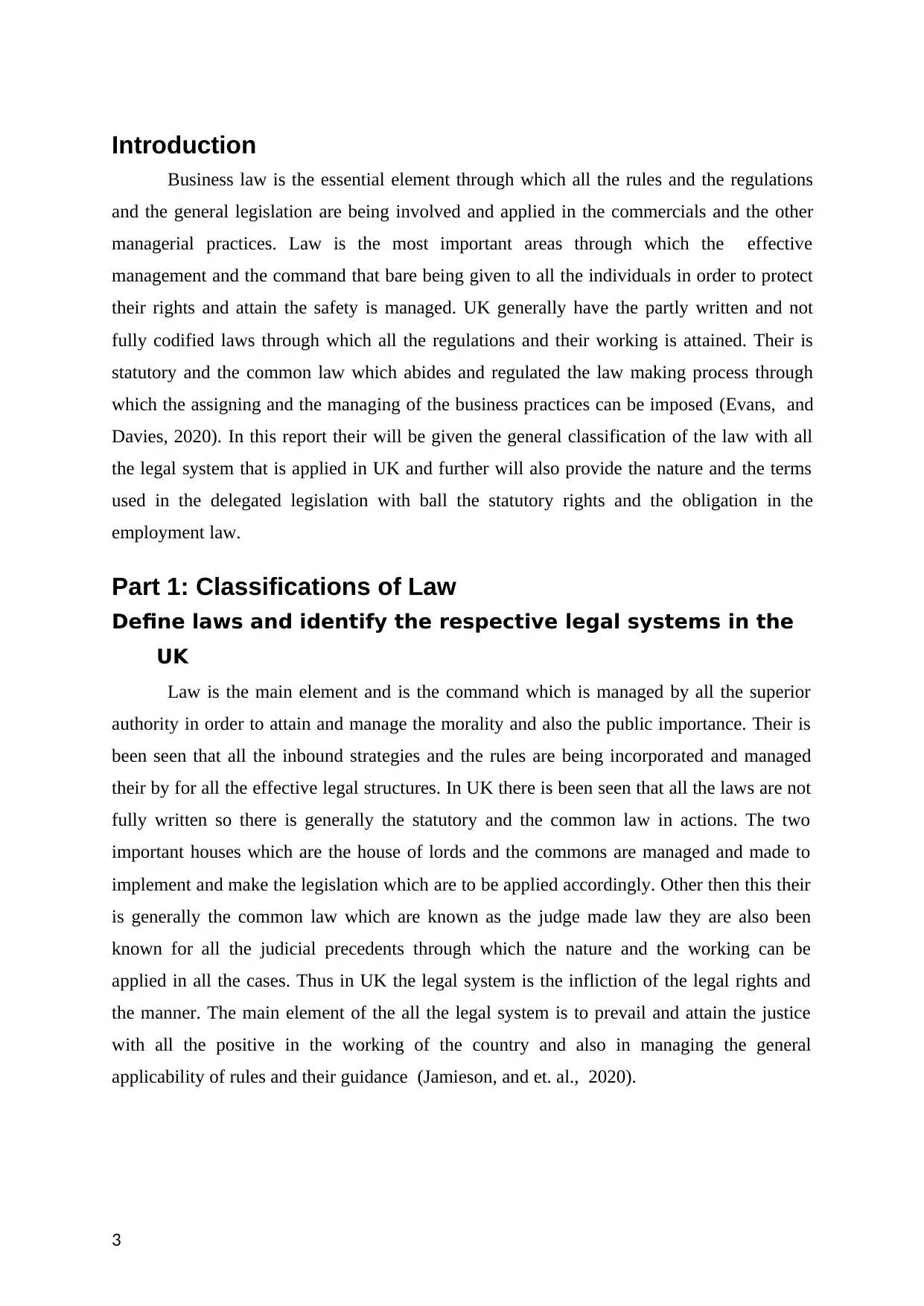
Introduction
Business law is the essential element through which all the rules and the regulations
and the general legislation are being involved and applied in the commercials and the other
managerial practices. Law is the most important areas through which the effective
management and the command that bare being given to all the individuals in order to protect
their rights and attain the safety is managed. UK generally have the partly written and not
fully codified laws through which all the regulations and their working is attained. Their is
statutory and the common law which abides and regulated the law making process through
which the assigning and the managing of the business practices can be imposed (Evans, and
Davies, 2020). In this report their will be given the general classification of the law with all
the legal system that is applied in UK and further will also provide the nature and the terms
used in the delegated legislation with ball the statutory rights and the obligation in the
employment law.
Part 1: Classifications of Law
Define laws and identify the respective legal systems in the
UK
Law is the main element and is the command which is managed by all the superior
authority in order to attain and manage the morality and also the public importance. Their is
been seen that all the inbound strategies and the rules are being incorporated and managed
their by for all the effective legal structures. In UK there is been seen that all the laws are not
fully written so there is generally the statutory and the common law in actions. The two
important houses which are the house of lords and the commons are managed and made to
implement and make the legislation which are to be applied accordingly. Other then this their
is generally the common law which are known as the judge made law they are also been
known for all the judicial precedents through which the nature and the working can be
applied in all the cases. Thus in UK the legal system is the infliction of the legal rights and
the manner. The main element of the all the legal system is to prevail and attain the justice
with all the positive in the working of the country and also in managing the general
applicability of rules and their guidance (Jamieson, and et. al., 2020).
3
Business law is the essential element through which all the rules and the regulations
and the general legislation are being involved and applied in the commercials and the other
managerial practices. Law is the most important areas through which the effective
management and the command that bare being given to all the individuals in order to protect
their rights and attain the safety is managed. UK generally have the partly written and not
fully codified laws through which all the regulations and their working is attained. Their is
statutory and the common law which abides and regulated the law making process through
which the assigning and the managing of the business practices can be imposed (Evans, and
Davies, 2020). In this report their will be given the general classification of the law with all
the legal system that is applied in UK and further will also provide the nature and the terms
used in the delegated legislation with ball the statutory rights and the obligation in the
employment law.
Part 1: Classifications of Law
Define laws and identify the respective legal systems in the
UK
Law is the main element and is the command which is managed by all the superior
authority in order to attain and manage the morality and also the public importance. Their is
been seen that all the inbound strategies and the rules are being incorporated and managed
their by for all the effective legal structures. In UK there is been seen that all the laws are not
fully written so there is generally the statutory and the common law in actions. The two
important houses which are the house of lords and the commons are managed and made to
implement and make the legislation which are to be applied accordingly. Other then this their
is generally the common law which are known as the judge made law they are also been
known for all the judicial precedents through which the nature and the working can be
applied in all the cases. Thus in UK the legal system is the infliction of the legal rights and
the manner. The main element of the all the legal system is to prevail and attain the justice
with all the positive in the working of the country and also in managing the general
applicability of rules and their guidance (Jamieson, and et. al., 2020).
3
⊘ This is a preview!⊘
Do you want full access?
Subscribe today to unlock all pages.

Trusted by 1+ million students worldwide
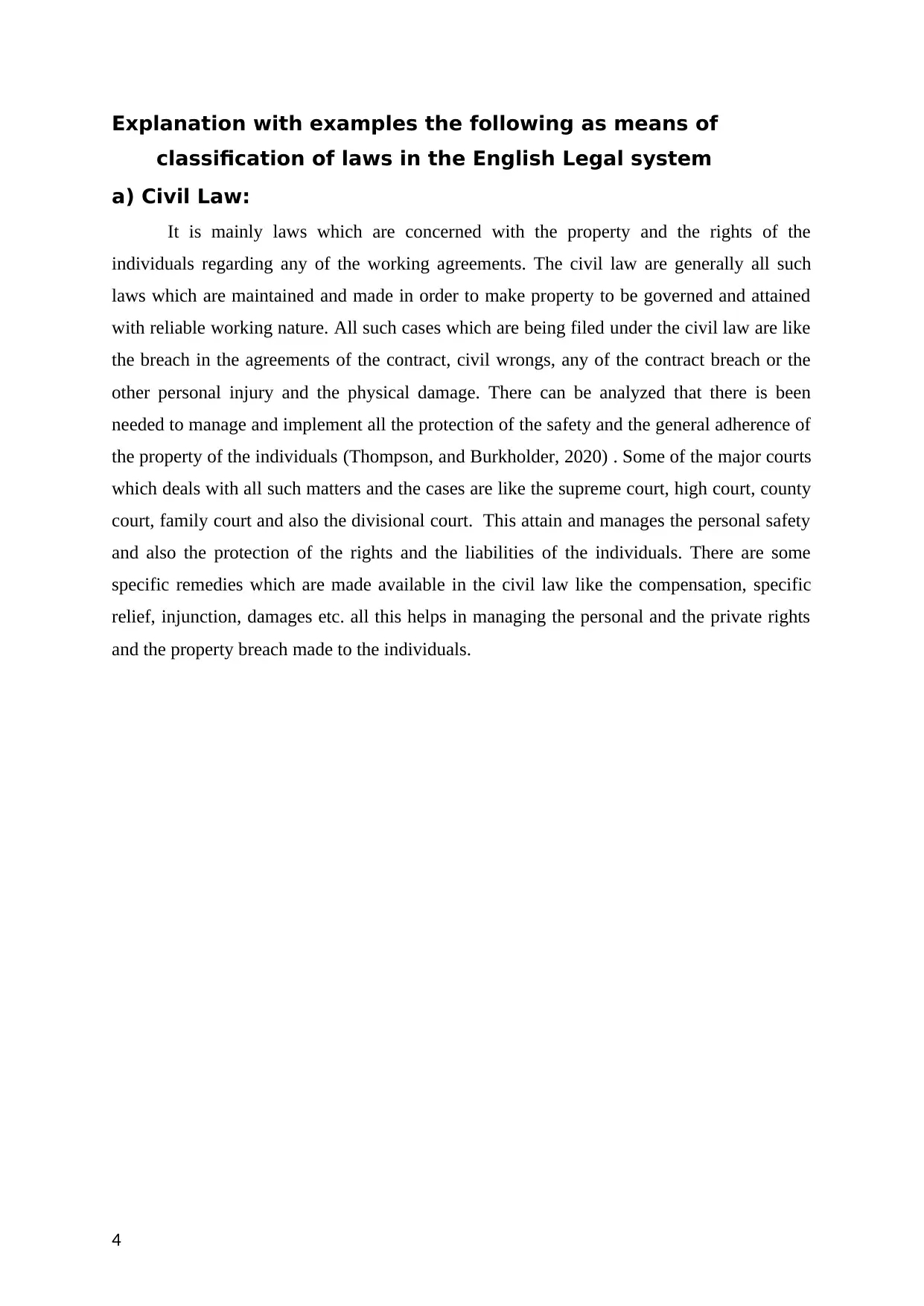
Explanation with examples the following as means of
classification of laws in the English Legal system
a) Civil Law:
It is mainly laws which are concerned with the property and the rights of the
individuals regarding any of the working agreements. The civil law are generally all such
laws which are maintained and made in order to make property to be governed and attained
with reliable working nature. All such cases which are being filed under the civil law are like
the breach in the agreements of the contract, civil wrongs, any of the contract breach or the
other personal injury and the physical damage. There can be analyzed that there is been
needed to manage and implement all the protection of the safety and the general adherence of
the property of the individuals (Thompson, and Burkholder, 2020) . Some of the major courts
which deals with all such matters and the cases are like the supreme court, high court, county
court, family court and also the divisional court. This attain and manages the personal safety
and also the protection of the rights and the liabilities of the individuals. There are some
specific remedies which are made available in the civil law like the compensation, specific
relief, injunction, damages etc. all this helps in managing the personal and the private rights
and the property breach made to the individuals.
4
classification of laws in the English Legal system
a) Civil Law:
It is mainly laws which are concerned with the property and the rights of the
individuals regarding any of the working agreements. The civil law are generally all such
laws which are maintained and made in order to make property to be governed and attained
with reliable working nature. All such cases which are being filed under the civil law are like
the breach in the agreements of the contract, civil wrongs, any of the contract breach or the
other personal injury and the physical damage. There can be analyzed that there is been
needed to manage and implement all the protection of the safety and the general adherence of
the property of the individuals (Thompson, and Burkholder, 2020) . Some of the major courts
which deals with all such matters and the cases are like the supreme court, high court, county
court, family court and also the divisional court. This attain and manages the personal safety
and also the protection of the rights and the liabilities of the individuals. There are some
specific remedies which are made available in the civil law like the compensation, specific
relief, injunction, damages etc. all this helps in managing the personal and the private rights
and the property breach made to the individuals.
4
Paraphrase This Document
Need a fresh take? Get an instant paraphrase of this document with our AI Paraphraser
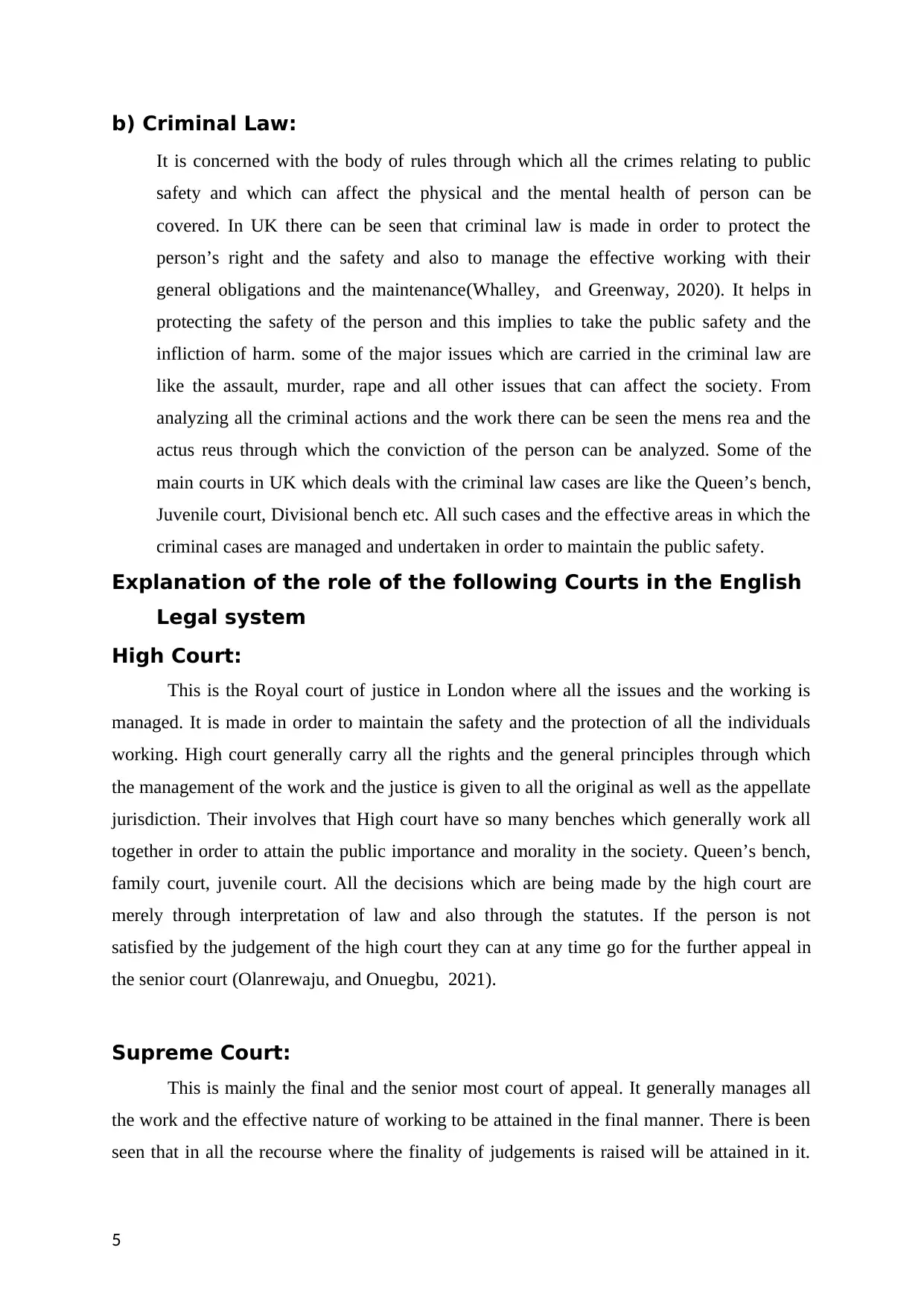
b) Criminal Law:
It is concerned with the body of rules through which all the crimes relating to public
safety and which can affect the physical and the mental health of person can be
covered. In UK there can be seen that criminal law is made in order to protect the
person’s right and the safety and also to manage the effective working with their
general obligations and the maintenance(Whalley, and Greenway, 2020). It helps in
protecting the safety of the person and this implies to take the public safety and the
infliction of harm. some of the major issues which are carried in the criminal law are
like the assault, murder, rape and all other issues that can affect the society. From
analyzing all the criminal actions and the work there can be seen the mens rea and the
actus reus through which the conviction of the person can be analyzed. Some of the
main courts in UK which deals with the criminal law cases are like the Queen’s bench,
Juvenile court, Divisional bench etc. All such cases and the effective areas in which the
criminal cases are managed and undertaken in order to maintain the public safety.
Explanation of the role of the following Courts in the English
Legal system
High Court:
This is the Royal court of justice in London where all the issues and the working is
managed. It is made in order to maintain the safety and the protection of all the individuals
working. High court generally carry all the rights and the general principles through which
the management of the work and the justice is given to all the original as well as the appellate
jurisdiction. Their involves that High court have so many benches which generally work all
together in order to attain the public importance and morality in the society. Queen’s bench,
family court, juvenile court. All the decisions which are being made by the high court are
merely through interpretation of law and also through the statutes. If the person is not
satisfied by the judgement of the high court they can at any time go for the further appeal in
the senior court (Olanrewaju, and Onuegbu, 2021).
Supreme Court:
This is mainly the final and the senior most court of appeal. It generally manages all
the work and the effective nature of working to be attained in the final manner. There is been
seen that in all the recourse where the finality of judgements is raised will be attained in it.
5
It is concerned with the body of rules through which all the crimes relating to public
safety and which can affect the physical and the mental health of person can be
covered. In UK there can be seen that criminal law is made in order to protect the
person’s right and the safety and also to manage the effective working with their
general obligations and the maintenance(Whalley, and Greenway, 2020). It helps in
protecting the safety of the person and this implies to take the public safety and the
infliction of harm. some of the major issues which are carried in the criminal law are
like the assault, murder, rape and all other issues that can affect the society. From
analyzing all the criminal actions and the work there can be seen the mens rea and the
actus reus through which the conviction of the person can be analyzed. Some of the
main courts in UK which deals with the criminal law cases are like the Queen’s bench,
Juvenile court, Divisional bench etc. All such cases and the effective areas in which the
criminal cases are managed and undertaken in order to maintain the public safety.
Explanation of the role of the following Courts in the English
Legal system
High Court:
This is the Royal court of justice in London where all the issues and the working is
managed. It is made in order to maintain the safety and the protection of all the individuals
working. High court generally carry all the rights and the general principles through which
the management of the work and the justice is given to all the original as well as the appellate
jurisdiction. Their involves that High court have so many benches which generally work all
together in order to attain the public importance and morality in the society. Queen’s bench,
family court, juvenile court. All the decisions which are being made by the high court are
merely through interpretation of law and also through the statutes. If the person is not
satisfied by the judgement of the high court they can at any time go for the further appeal in
the senior court (Olanrewaju, and Onuegbu, 2021).
Supreme Court:
This is mainly the final and the senior most court of appeal. It generally manages all
the work and the effective nature of working to be attained in the final manner. There is been
seen that in all the recourse where the finality of judgements is raised will be attained in it.
5
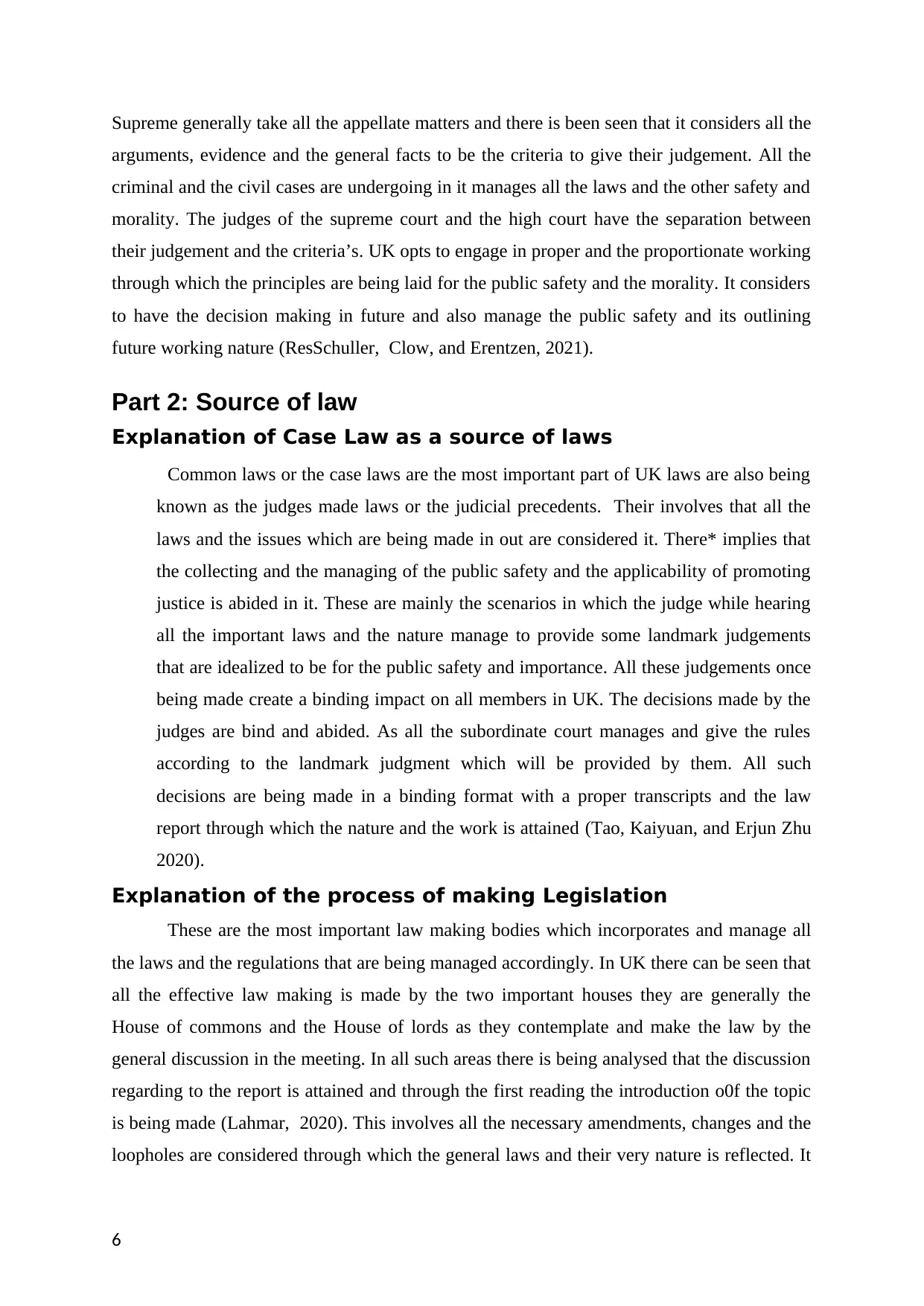
Supreme generally take all the appellate matters and there is been seen that it considers all the
arguments, evidence and the general facts to be the criteria to give their judgement. All the
criminal and the civil cases are undergoing in it manages all the laws and the other safety and
morality. The judges of the supreme court and the high court have the separation between
their judgement and the criteria’s. UK opts to engage in proper and the proportionate working
through which the principles are being laid for the public safety and the morality. It considers
to have the decision making in future and also manage the public safety and its outlining
future working nature (ResSchuller, Clow, and Erentzen, 2021).
Part 2: Source of law
Explanation of Case Law as a source of laws
Common laws or the case laws are the most important part of UK laws are also being
known as the judges made laws or the judicial precedents. Their involves that all the
laws and the issues which are being made in out are considered it. There* implies that
the collecting and the managing of the public safety and the applicability of promoting
justice is abided in it. These are mainly the scenarios in which the judge while hearing
all the important laws and the nature manage to provide some landmark judgements
that are idealized to be for the public safety and importance. All these judgements once
being made create a binding impact on all members in UK. The decisions made by the
judges are bind and abided. As all the subordinate court manages and give the rules
according to the landmark judgment which will be provided by them. All such
decisions are being made in a binding format with a proper transcripts and the law
report through which the nature and the work is attained (Tao, Kaiyuan, and Erjun Zhu
2020).
Explanation of the process of making Legislation
These are the most important law making bodies which incorporates and manage all
the laws and the regulations that are being managed accordingly. In UK there can be seen that
all the effective law making is made by the two important houses they are generally the
House of commons and the House of lords as they contemplate and make the law by the
general discussion in the meeting. In all such areas there is being analysed that the discussion
regarding to the report is attained and through the first reading the introduction o0f the topic
is being made (Lahmar, 2020). This involves all the necessary amendments, changes and the
loopholes are considered through which the general laws and their very nature is reflected. It
6
arguments, evidence and the general facts to be the criteria to give their judgement. All the
criminal and the civil cases are undergoing in it manages all the laws and the other safety and
morality. The judges of the supreme court and the high court have the separation between
their judgement and the criteria’s. UK opts to engage in proper and the proportionate working
through which the principles are being laid for the public safety and the morality. It considers
to have the decision making in future and also manage the public safety and its outlining
future working nature (ResSchuller, Clow, and Erentzen, 2021).
Part 2: Source of law
Explanation of Case Law as a source of laws
Common laws or the case laws are the most important part of UK laws are also being
known as the judges made laws or the judicial precedents. Their involves that all the
laws and the issues which are being made in out are considered it. There* implies that
the collecting and the managing of the public safety and the applicability of promoting
justice is abided in it. These are mainly the scenarios in which the judge while hearing
all the important laws and the nature manage to provide some landmark judgements
that are idealized to be for the public safety and importance. All these judgements once
being made create a binding impact on all members in UK. The decisions made by the
judges are bind and abided. As all the subordinate court manages and give the rules
according to the landmark judgment which will be provided by them. All such
decisions are being made in a binding format with a proper transcripts and the law
report through which the nature and the work is attained (Tao, Kaiyuan, and Erjun Zhu
2020).
Explanation of the process of making Legislation
These are the most important law making bodies which incorporates and manage all
the laws and the regulations that are being managed accordingly. In UK there can be seen that
all the effective law making is made by the two important houses they are generally the
House of commons and the House of lords as they contemplate and make the law by the
general discussion in the meeting. In all such areas there is being analysed that the discussion
regarding to the report is attained and through the first reading the introduction o0f the topic
is being made (Lahmar, 2020). This involves all the necessary amendments, changes and the
loopholes are considered through which the general laws and their very nature is reflected. It
6
⊘ This is a preview!⊘
Do you want full access?
Subscribe today to unlock all pages.

Trusted by 1+ million students worldwide
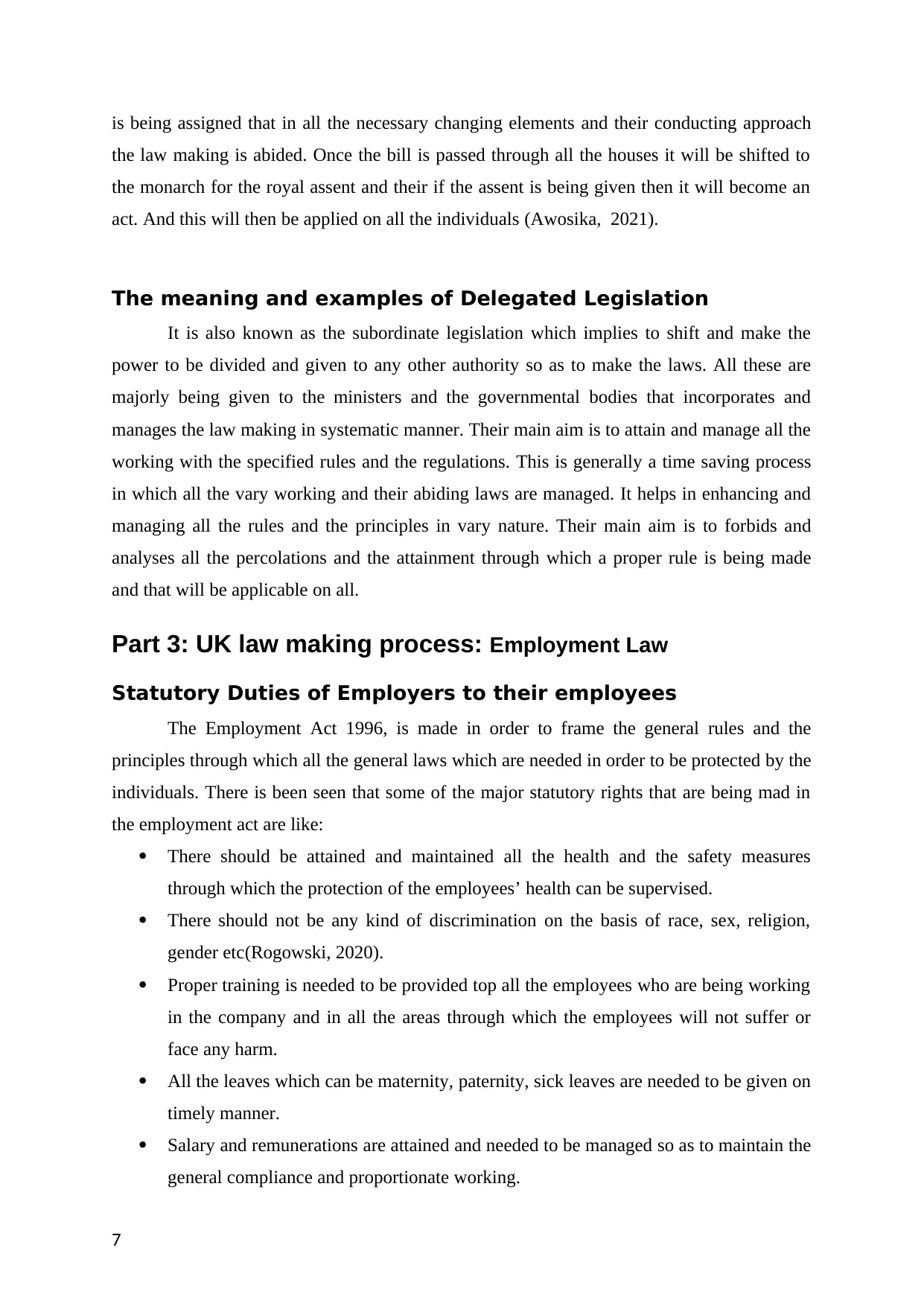
is being assigned that in all the necessary changing elements and their conducting approach
the law making is abided. Once the bill is passed through all the houses it will be shifted to
the monarch for the royal assent and their if the assent is being given then it will become an
act. And this will then be applied on all the individuals (Awosika, 2021).
The meaning and examples of Delegated Legislation
It is also known as the subordinate legislation which implies to shift and make the
power to be divided and given to any other authority so as to make the laws. All these are
majorly being given to the ministers and the governmental bodies that incorporates and
manages the law making in systematic manner. Their main aim is to attain and manage all the
working with the specified rules and the regulations. This is generally a time saving process
in which all the vary working and their abiding laws are managed. It helps in enhancing and
managing all the rules and the principles in vary nature. Their main aim is to forbids and
analyses all the percolations and the attainment through which a proper rule is being made
and that will be applicable on all.
Part 3: UK law making process: Employment Law
Statutory Duties of Employers to their employees
The Employment Act 1996, is made in order to frame the general rules and the
principles through which all the general laws which are needed in order to be protected by the
individuals. There is been seen that some of the major statutory rights that are being mad in
the employment act are like:
There should be attained and maintained all the health and the safety measures
through which the protection of the employees’ health can be supervised.
There should not be any kind of discrimination on the basis of race, sex, religion,
gender etc(Rogowski, 2020).
Proper training is needed to be provided top all the employees who are being working
in the company and in all the areas through which the employees will not suffer or
face any harm.
All the leaves which can be maternity, paternity, sick leaves are needed to be given on
timely manner.
Salary and remunerations are attained and needed to be managed so as to maintain the
general compliance and proportionate working.
7
the law making is abided. Once the bill is passed through all the houses it will be shifted to
the monarch for the royal assent and their if the assent is being given then it will become an
act. And this will then be applied on all the individuals (Awosika, 2021).
The meaning and examples of Delegated Legislation
It is also known as the subordinate legislation which implies to shift and make the
power to be divided and given to any other authority so as to make the laws. All these are
majorly being given to the ministers and the governmental bodies that incorporates and
manages the law making in systematic manner. Their main aim is to attain and manage all the
working with the specified rules and the regulations. This is generally a time saving process
in which all the vary working and their abiding laws are managed. It helps in enhancing and
managing all the rules and the principles in vary nature. Their main aim is to forbids and
analyses all the percolations and the attainment through which a proper rule is being made
and that will be applicable on all.
Part 3: UK law making process: Employment Law
Statutory Duties of Employers to their employees
The Employment Act 1996, is made in order to frame the general rules and the
principles through which all the general laws which are needed in order to be protected by the
individuals. There is been seen that some of the major statutory rights that are being mad in
the employment act are like:
There should be attained and maintained all the health and the safety measures
through which the protection of the employees’ health can be supervised.
There should not be any kind of discrimination on the basis of race, sex, religion,
gender etc(Rogowski, 2020).
Proper training is needed to be provided top all the employees who are being working
in the company and in all the areas through which the employees will not suffer or
face any harm.
All the leaves which can be maternity, paternity, sick leaves are needed to be given on
timely manner.
Salary and remunerations are attained and needed to be managed so as to maintain the
general compliance and proportionate working.
7
Paraphrase This Document
Need a fresh take? Get an instant paraphrase of this document with our AI Paraphraser
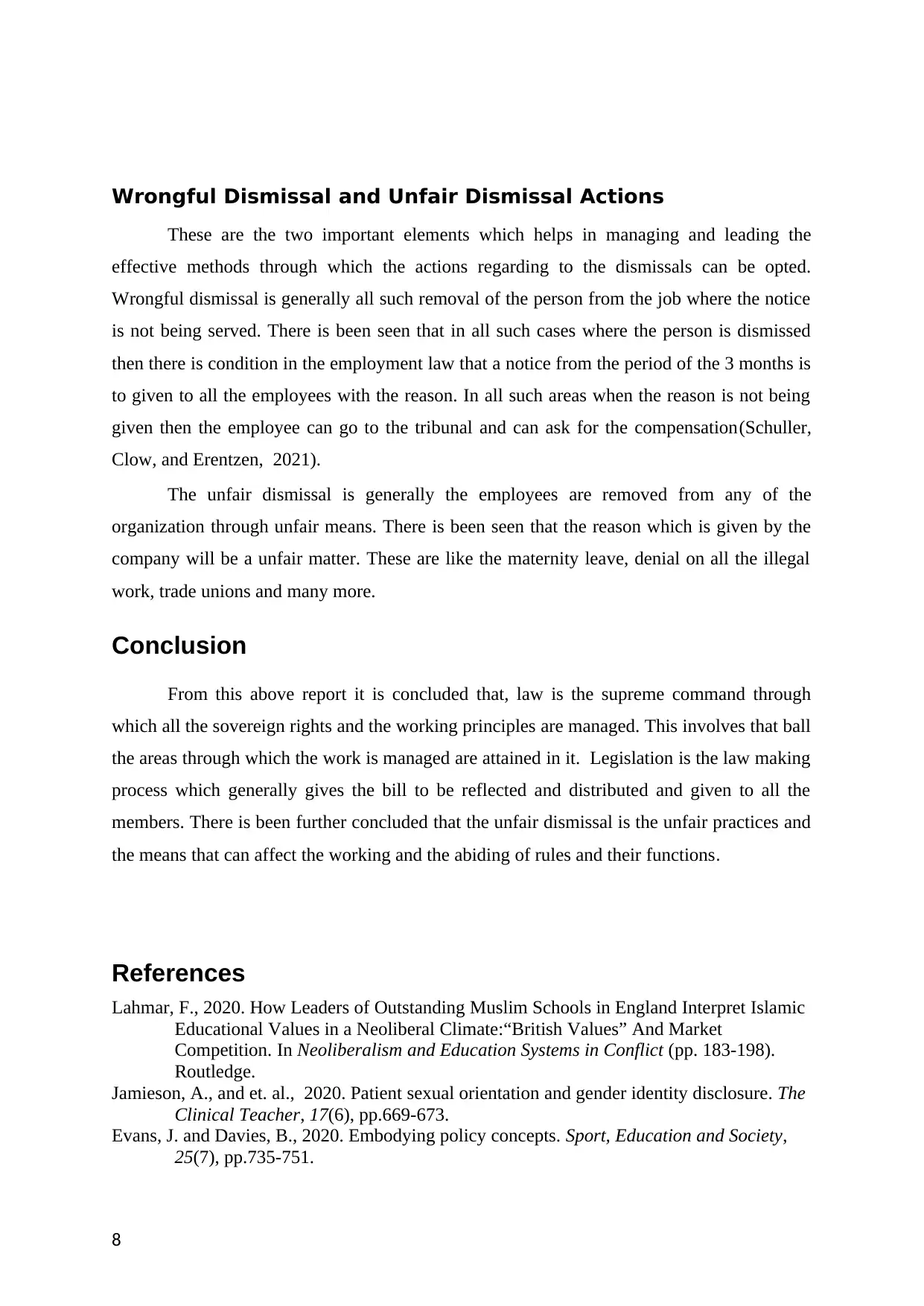
Wrongful Dismissal and Unfair Dismissal Actions
These are the two important elements which helps in managing and leading the
effective methods through which the actions regarding to the dismissals can be opted.
Wrongful dismissal is generally all such removal of the person from the job where the notice
is not being served. There is been seen that in all such cases where the person is dismissed
then there is condition in the employment law that a notice from the period of the 3 months is
to given to all the employees with the reason. In all such areas when the reason is not being
given then the employee can go to the tribunal and can ask for the compensation(Schuller,
Clow, and Erentzen, 2021).
The unfair dismissal is generally the employees are removed from any of the
organization through unfair means. There is been seen that the reason which is given by the
company will be a unfair matter. These are like the maternity leave, denial on all the illegal
work, trade unions and many more.
Conclusion
From this above report it is concluded that, law is the supreme command through
which all the sovereign rights and the working principles are managed. This involves that ball
the areas through which the work is managed are attained in it. Legislation is the law making
process which generally gives the bill to be reflected and distributed and given to all the
members. There is been further concluded that the unfair dismissal is the unfair practices and
the means that can affect the working and the abiding of rules and their functions.
References
Lahmar, F., 2020. How Leaders of Outstanding Muslim Schools in England Interpret Islamic
Educational Values in a Neoliberal Climate:“British Values” And Market
Competition. In Neoliberalism and Education Systems in Conflict (pp. 183-198).
Routledge.
Jamieson, A., and et. al., 2020. Patient sexual orientation and gender identity disclosure. The
Clinical Teacher, 17(6), pp.669-673.
Evans, J. and Davies, B., 2020. Embodying policy concepts. Sport, Education and Society,
25(7), pp.735-751.
8
These are the two important elements which helps in managing and leading the
effective methods through which the actions regarding to the dismissals can be opted.
Wrongful dismissal is generally all such removal of the person from the job where the notice
is not being served. There is been seen that in all such cases where the person is dismissed
then there is condition in the employment law that a notice from the period of the 3 months is
to given to all the employees with the reason. In all such areas when the reason is not being
given then the employee can go to the tribunal and can ask for the compensation(Schuller,
Clow, and Erentzen, 2021).
The unfair dismissal is generally the employees are removed from any of the
organization through unfair means. There is been seen that the reason which is given by the
company will be a unfair matter. These are like the maternity leave, denial on all the illegal
work, trade unions and many more.
Conclusion
From this above report it is concluded that, law is the supreme command through
which all the sovereign rights and the working principles are managed. This involves that ball
the areas through which the work is managed are attained in it. Legislation is the law making
process which generally gives the bill to be reflected and distributed and given to all the
members. There is been further concluded that the unfair dismissal is the unfair practices and
the means that can affect the working and the abiding of rules and their functions.
References
Lahmar, F., 2020. How Leaders of Outstanding Muslim Schools in England Interpret Islamic
Educational Values in a Neoliberal Climate:“British Values” And Market
Competition. In Neoliberalism and Education Systems in Conflict (pp. 183-198).
Routledge.
Jamieson, A., and et. al., 2020. Patient sexual orientation and gender identity disclosure. The
Clinical Teacher, 17(6), pp.669-673.
Evans, J. and Davies, B., 2020. Embodying policy concepts. Sport, Education and Society,
25(7), pp.735-751.
8
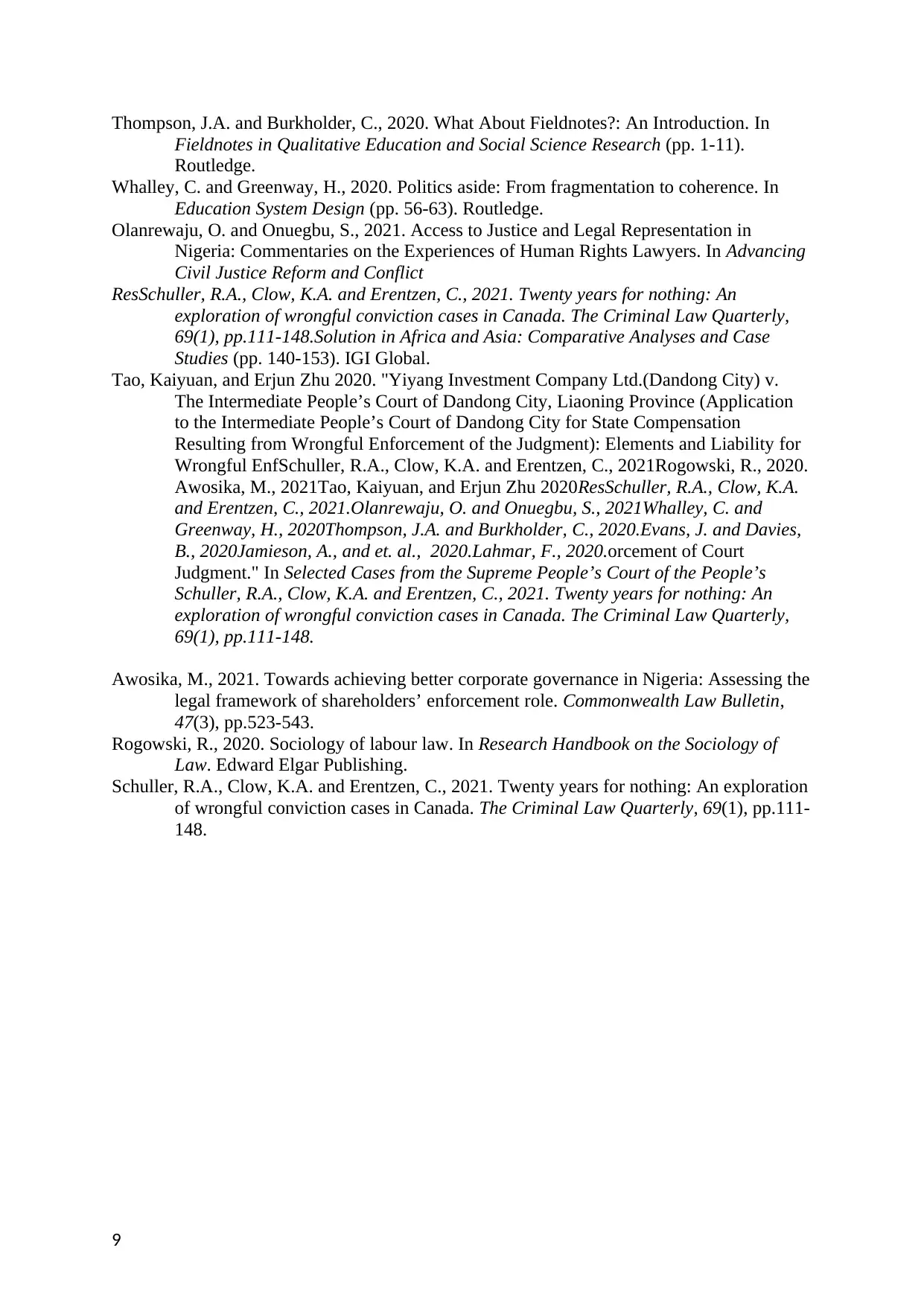
Thompson, J.A. and Burkholder, C., 2020. What About Fieldnotes?: An Introduction. In
Fieldnotes in Qualitative Education and Social Science Research (pp. 1-11).
Routledge.
Whalley, C. and Greenway, H., 2020. Politics aside: From fragmentation to coherence. In
Education System Design (pp. 56-63). Routledge.
Olanrewaju, O. and Onuegbu, S., 2021. Access to Justice and Legal Representation in
Nigeria: Commentaries on the Experiences of Human Rights Lawyers. In Advancing
Civil Justice Reform and Conflict
ResSchuller, R.A., Clow, K.A. and Erentzen, C., 2021. Twenty years for nothing: An
exploration of wrongful conviction cases in Canada. The Criminal Law Quarterly,
69(1), pp.111-148.Solution in Africa and Asia: Comparative Analyses and Case
Studies (pp. 140-153). IGI Global.
Tao, Kaiyuan, and Erjun Zhu 2020. "Yiyang Investment Company Ltd.(Dandong City) v.
The Intermediate People’s Court of Dandong City, Liaoning Province (Application
to the Intermediate People’s Court of Dandong City for State Compensation
Resulting from Wrongful Enforcement of the Judgment): Elements and Liability for
Wrongful EnfSchuller, R.A., Clow, K.A. and Erentzen, C., 2021Rogowski, R., 2020.
Awosika, M., 2021Tao, Kaiyuan, and Erjun Zhu 2020ResSchuller, R.A., Clow, K.A.
and Erentzen, C., 2021.Olanrewaju, O. and Onuegbu, S., 2021Whalley, C. and
Greenway, H., 2020Thompson, J.A. and Burkholder, C., 2020.Evans, J. and Davies,
B., 2020Jamieson, A., and et. al., 2020.Lahmar, F., 2020.orcement of Court
Judgment." In Selected Cases from the Supreme People’s Court of the People’s
Schuller, R.A., Clow, K.A. and Erentzen, C., 2021. Twenty years for nothing: An
exploration of wrongful conviction cases in Canada. The Criminal Law Quarterly,
69(1), pp.111-148.
Awosika, M., 2021. Towards achieving better corporate governance in Nigeria: Assessing the
legal framework of shareholders’ enforcement role. Commonwealth Law Bulletin,
47(3), pp.523-543.
Rogowski, R., 2020. Sociology of labour law. In Research Handbook on the Sociology of
Law. Edward Elgar Publishing.
Schuller, R.A., Clow, K.A. and Erentzen, C., 2021. Twenty years for nothing: An exploration
of wrongful conviction cases in Canada. The Criminal Law Quarterly, 69(1), pp.111-
148.
9
Fieldnotes in Qualitative Education and Social Science Research (pp. 1-11).
Routledge.
Whalley, C. and Greenway, H., 2020. Politics aside: From fragmentation to coherence. In
Education System Design (pp. 56-63). Routledge.
Olanrewaju, O. and Onuegbu, S., 2021. Access to Justice and Legal Representation in
Nigeria: Commentaries on the Experiences of Human Rights Lawyers. In Advancing
Civil Justice Reform and Conflict
ResSchuller, R.A., Clow, K.A. and Erentzen, C., 2021. Twenty years for nothing: An
exploration of wrongful conviction cases in Canada. The Criminal Law Quarterly,
69(1), pp.111-148.Solution in Africa and Asia: Comparative Analyses and Case
Studies (pp. 140-153). IGI Global.
Tao, Kaiyuan, and Erjun Zhu 2020. "Yiyang Investment Company Ltd.(Dandong City) v.
The Intermediate People’s Court of Dandong City, Liaoning Province (Application
to the Intermediate People’s Court of Dandong City for State Compensation
Resulting from Wrongful Enforcement of the Judgment): Elements and Liability for
Wrongful EnfSchuller, R.A., Clow, K.A. and Erentzen, C., 2021Rogowski, R., 2020.
Awosika, M., 2021Tao, Kaiyuan, and Erjun Zhu 2020ResSchuller, R.A., Clow, K.A.
and Erentzen, C., 2021.Olanrewaju, O. and Onuegbu, S., 2021Whalley, C. and
Greenway, H., 2020Thompson, J.A. and Burkholder, C., 2020.Evans, J. and Davies,
B., 2020Jamieson, A., and et. al., 2020.Lahmar, F., 2020.orcement of Court
Judgment." In Selected Cases from the Supreme People’s Court of the People’s
Schuller, R.A., Clow, K.A. and Erentzen, C., 2021. Twenty years for nothing: An
exploration of wrongful conviction cases in Canada. The Criminal Law Quarterly,
69(1), pp.111-148.
Awosika, M., 2021. Towards achieving better corporate governance in Nigeria: Assessing the
legal framework of shareholders’ enforcement role. Commonwealth Law Bulletin,
47(3), pp.523-543.
Rogowski, R., 2020. Sociology of labour law. In Research Handbook on the Sociology of
Law. Edward Elgar Publishing.
Schuller, R.A., Clow, K.A. and Erentzen, C., 2021. Twenty years for nothing: An exploration
of wrongful conviction cases in Canada. The Criminal Law Quarterly, 69(1), pp.111-
148.
9
⊘ This is a preview!⊘
Do you want full access?
Subscribe today to unlock all pages.

Trusted by 1+ million students worldwide
1 out of 9
Related Documents
Your All-in-One AI-Powered Toolkit for Academic Success.
+13062052269
info@desklib.com
Available 24*7 on WhatsApp / Email
![[object Object]](/_next/static/media/star-bottom.7253800d.svg)
Unlock your academic potential
Copyright © 2020–2026 A2Z Services. All Rights Reserved. Developed and managed by ZUCOL.
